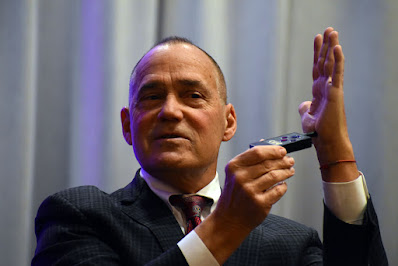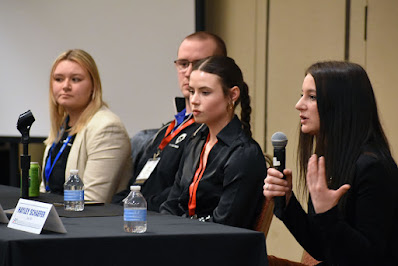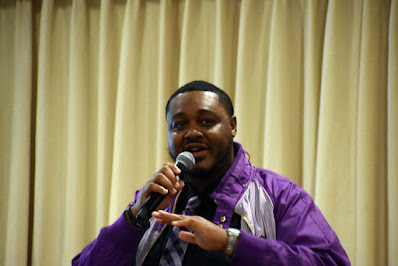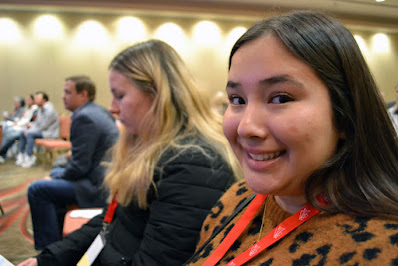 |
| Over image from Amazon.com. |
In my media history classes, we do spend some time on Watergate, a scandal that started in 1972 and eventually brought down a president who had just won a landslide reelection.
But I also mention Spiro Agnew, President Nixon’s first vice president, forced to resign in disgrace. Mostly I teach about him because, as the designated attack dog of the Nixon years, Agnew constantly attacked the news media, pointing the way to a Republican strategy of shooting the messenger that has intensified as it continued through the decades.
While Richard Nixon was no Donald Trump—in Nixon’s case, he was a long-time public servant who had some grasp of both government and history, subjects that Trump has flunked in his adult life—Nixon’s scandals did scar and shape the future of his party. So there is a through line to the modern GOP flirting with a cult of personality and proto-fascism.
Anyway, I just finished reading “Bag Man: The Wild Crimes, Audacious Cover-Up & Spectacular Downfall of a Brazen Crook in the White House” by Rachel Maddow and Michael Yarvitz. I did a few seconds of internet research, but could not find out who drew the interesting cartoons that begin each chapter—a mystery to me that I wish I could solve.
Despite wondering where the cover and chapter art comes from, I found the book to be a readable, interesting summary, not just of Spiro Agnew’s crimes, uncovered by federal prosecutors in Baltimore, Maryland—it’s instructive in terms of how Agnew chose to fight the charges and frame the scandal.
 |
| From Wikimedia Commons, official White House mug shot of a criminal: Vice President Spiro Agnew. |
Because he pretty clearly was a felon. He had taken large cash bribes to award construction contracts for state projects as governor of Maryland--and continued to take bribes as Nixon's VP. But to get him out of office before Nixon’s fall—otherwise the U.S. would have had a criminal president, something we didn’t really get until we crazily elected one in 2016—the Justice Department agrees to let Agnew escape the ignominy of wearing prison garb in exchange for his quitting.
The Nixon years were years of political shocks. There was Lyndon Johnson, deciding in March of 1968 to quit the race for reelection even as Nixon's primary campaign was just taking hold. Bobby Kennedy being shot during the primary campaign. Nixon picking an obscure, right-wing governor of Maryland, who he never respected, because Nixon was shoring up right-wing support in his own party. A close election that Nixon won. Years of paranoia about the media culminating in the CREEP engaging in clumsy, illegal manipulation in 1972.
And just as Johnson stunned the nation in 1968 with his sudden departure from the campaign, we have the sudden execution of the “the deal,” where Agnew unexpectedly cashed in the only cards he held, giving up his public office. He maintained his innocence, not just to the end, but beyond, claiming at one point that Nixon was plotting to have him killed and that federal prosecutors had engaged in a “witch hunt” against him.
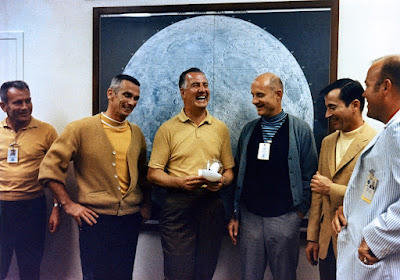 |
| Happier days for Spiro Agnew--as VP, meeting crew of Apollo 10 in 1968. NASA official image downloaded from Wikimedia Commons. |
I was pretty young when it all broke and, at least briefly in my young adulthood, a Republican. But I lived in a newsy house—my parents always watched the nightly news, they subscribed to three daily newspapers and news was always around. I never bought into Agnew’s version; it was pretty obvious at the time to any consumer of the news that he was a crook.
Yet he did maintain a base of support. I suppose he could have shot a man on Fifth Avenue and some of his supporters would have remained loyal to him.
Politics in this country is a rough game—I guess it is globally and throughout human history. Just ask Julius Caesar what he thought of Brutus. Our particular times are not particularly different, except we have stumbled on a system that at least balances our worst impulses with some rule of law and some semblance of We the People having our say.
As our democracy wobbles a bit in election denial—face it, today’s Republicans, Joe Biden won with no trickery, deceit nor widespread conspiracy—it is nice that we survived those Nixon year shocks. Yet buying into Trump’s lies today is in line with a darker moment of your past recent history.
Agnew did it. Sure there was a witch hunt but the point is that there really was a witch (or warlock). They caught him but didn’t burn him just so that he would never become president. And Agnew's evasions created an odd playbook that, sadly, is still being applied by crooked politicians today.






